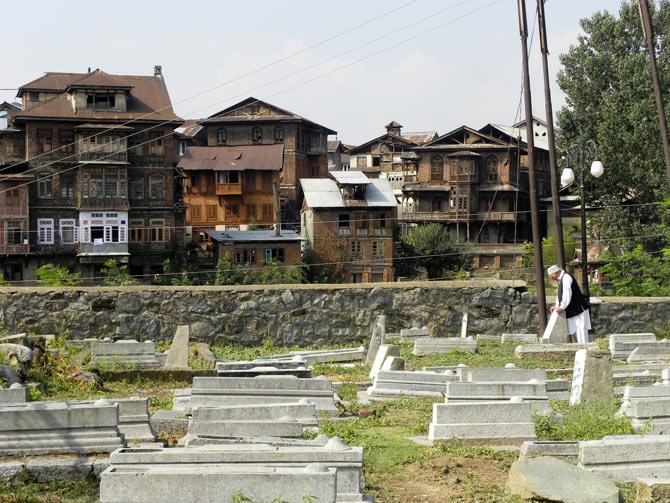
Mirwaiz Umar Farooq declares that neither force nor intimidation can silence the aspirations of the Kashmiri people, in the concluding part of his interview with Vaihayasi Pande Daniel.
Kashmir has been virtually turned into a police State. And the chief minister and the opposition are probably as helpless as the Hurriyat is," Mirwaiz Umar Farooq told Vaihayasi Pande Daniel in the first part of an interview earlier in September.
Part I: Mirwaiz: 'I personally don't see a revival of militancy in Kashmir'
In the second and concluding part of his interview, conducted in Srinagar and later over the telephone from Mumbai, he asks why Kashmiris need a passport to go over to the "other side" (meaning Pakistan-Occupied Kashmir).
Is the central government of late more relaxed in its control over the state?
The (LoC) bus was a CBM (confidence building measure) for the people of Kashmir. So it should have been given to the local administration. The local DC (district commissioner) from this side and the local DC from that side (Pakistan), they should be the ones in charge. Here it is the passport office. The passport office means indirectly the home ministry. It is the home ministry which is really controlling this LoC bus and train. It should have been decentralised and given to the state.
Or trade. You have trade. But you don’t have any banking system. You don’t have any international facilities. You don’t have fax, you don’t have telephone. You don’t have telex facilities. You are doing this barter system. That is like a thousand years old.
(The government) needs to either (be in) it fully and supporting it. Or it is just eyewash. Just a token thing, where you want to tell the world, yes, India and Pakistan are doing a lot. This is a great CBM for the people of Kashmir.
If we want to go to the other side of Kashmir let us go in our own cars. Why not? Yes, let them check. Let them have checks and balances.
Why do we need passports? Let us go on our – we have the special identity card. We can go on that. Why do we need documents, which take months? You have to get the clearance of the intelligence, the police and others.
It should be open to all. Right now it is open to somebody who has family on the other side. India says the entire state belongs to India, even the Pakistani side belongs to India. If that is the case then they should let people come and go.
I think there are things that are still being controlled and managed. We feel they have to let things go.
Please ...
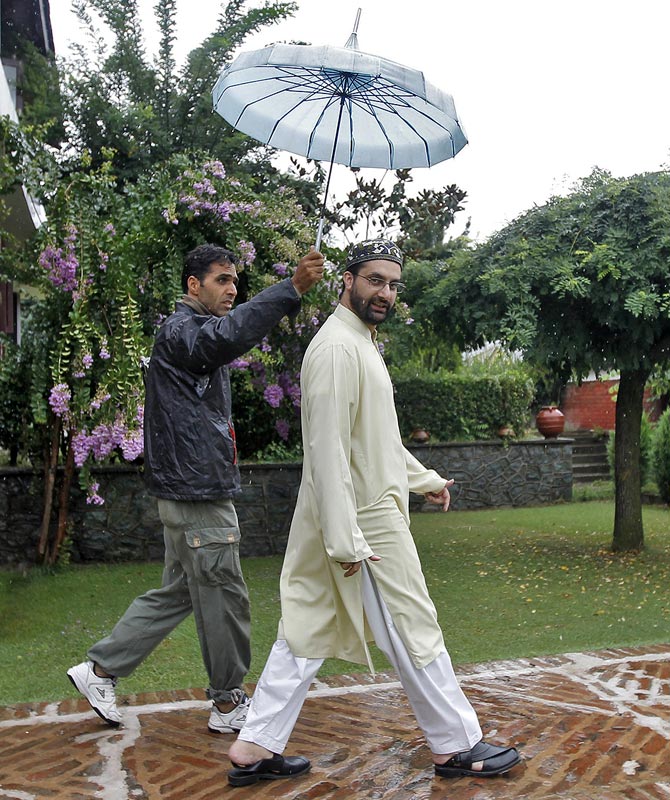
In your view, where does the local Kashmiri stand now? In which direction is the sentiment growing?
I definitely believe that there is a strong nationalist element now.
That it is growing all the time?
Definitely. Especially among the youth. Among the young generation. Among the educated class. That thought is emerging.
And they are moving away from Pakistan?
Pakistan has also been a factor, no doubt about it. There has been an emotional bonding and an attachment with Pakistan for years here.
Now there is a strong nationalist movement. After 2008-10, we saw it is more about Kashmiri identity, Kashmiri ethos, Kashmiri existence. I believe that is where the trend is.
It is also again about the fact that we have to define Kashmir. There are internal contradictions. When we talk about J & K state, it is not one homogeneous body. We have Ladakh on one side. Jammu on one side. I think there has to be more encouragement by both parties -- India and Pakistan -- to let the people also meet. It is very unfortunate that for the last 65 years there has been no effort between the regions.
 You took on the mantle of being the Mirwaiz when you were 17. It has probably been a gradual maturing process. What has been the key learning for you?
You took on the mantle of being the Mirwaiz when you were 17. It has probably been a gradual maturing process. What has been the key learning for you?
The most important, I have seen over the last 20-25 years that there is this wrong perception that through intimidation, through force, you can silence the people.
Aspirations cannot be silenced through force. I think that is most important as far as a relationship between Delhi and Srinagar is concerned.
Over the years, unfortunately, the gap between Delhi and Srinagar has widened, day by day, in spite of (their) giving money, giving resources.
Please ...
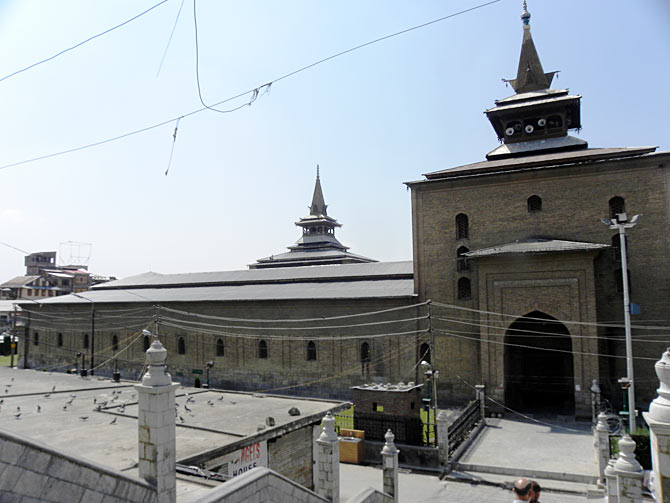
When you were younger you didn’t think this…
When the movement started it was more related to that group who came, that secessionist thought.
I feel over the years, that (aspiration) has definitely widened. We see a lot, especially among the youth, although militancy might have gone down, violence might have gone down. The Kashmir issue is no longer about militancy, terrorism and extremism. It is more about the aspirations of the Kashmiri people.
That is something, unfortunately, which still New Delhi knows but is not willing to recognise -- it is aspirations. You can’t change aspirations by giving incentives. By announcing economic packages. By giving roads and healthcare.
Yes (those are) important. We need all those things.
But you have to make a difference between grievances and aspirations. Grievances, I might have. I don’t have this. I don’t have that…
Aspirations are something much, much bigger than that. Over the years I have seen the Kashmiri aspirations get stronger.
Secondly, there is a gradual realisation that this problem is a complex problem. There has to be a gradual approach in addressing the problem. What we call a step by step approach.
That’s why even when people, like (former Pakistani president Pervez) Musharraf, come up with their own set of ideas, those were also welcome. People thought: Okay here is something we can start with. He talked about demilitarisation. About open borders. About free trade. He talked about joint management of resources, and this and that.
No doubt about the fact that UN resolutions are the basis as far as the Kashmir problem is concerned.
But there are many possibilities for an alternative negotiated settlement in Kashmir. That has to involve all the parties – India, Pakistan and Kashmir. I think sometimes when we see that India and Pakistan get going, they tend to forget about the fact that it is not only about India and Pakistan. It is about the people -- the Kashmiris -- so they have to take them along.
Also this misconception about Kashmir that it is an extremist society. That it is a very intolerant society. A violent society. That is not the case.
We have seen over the years that (even) when the whole of Kashmir was burning in 2008 -- the best example -- and we had the yatra going on, because the issue was about Amarnath land (the central and J&K state government decided to transfer 99 acres to the shrine trust), not a single yatri was touched, not a single tourist was touched. People facilitated, even in those days, they would let them come into their houses, so they did not have to be on the streets.
Kashmir has shown, by and large, that it is not about religion. It is more about political aspirations. The Kashmir problem is not a religious problem. It is not a Hindu India versus Muslim Kashmir, as many want to take it in that direction. It is a purely political problem.
Visitors to Kashmir have probably conveyed that as well?
Exactly. It is good that visitors come, tourists come. (For instance) nobody was against the yatra; even today Kashmir readily facilitates.
The only issue is that, yes, there are some genuine concerns about environment, about ecology. If those are addressed… For example, the recent tragedy in Uttarakhand is definitely a man-made tragedy. There has to be certain checks and balances.
If we talk about that, we are labelled as separatists, we are labelled as intolerant people. If someone in Uttarakhand or Jharkhand talks about that, then they are environmentalists.
The mainstream Indian view, unfortunately, has not changed much about Kashmir. That I see as maybe a weakness on our part... The general public in India don’t seem to be much bothered about what is happening in Kashmir.
Maybe they are not bothered about what is happening in other parts of India either?
…There is a misconception being created. For example there is talk about revocation of AFSPA. A section of civil society is supporting this. But we don’t see much support coming from Indian political parties. From local parties, from vibrant Indian society, from the elite. We see that these Bollywood people and these cricketers having views on all issues.
We see that they tend to remain silent when it comes to Kashmir. Because they have been made to believe that it is an issue of national interest.
Please ...
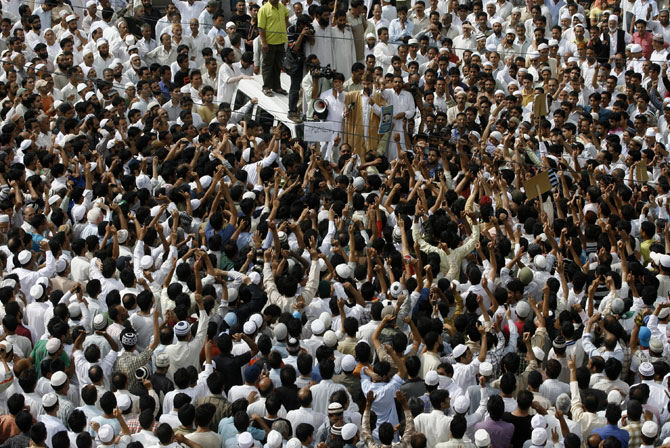
They are not free to speak?
Exactly, and people have to be very careful when they talk about these things.
For example this whole issue about Zubin Mehta thing -- somehow today Kashmiris are radical, they are anti-music. Which is not the case! When someone put me this question I said obviously as a Kashmiri I am proud of my culture. I want my fine arts, my music, my language to be recognised, to be supported. But that is not the question. Kashmir is sort of a flashpoint. Active conflict (is going on). You have a situation where India-Pakistan are (facing each other) on the border on the LoC. You have a situation where still 7,000 people are missing and you have unmarked graves. In a sense (the concert) does not appeal much to a common man. Who are the people who are going to be there? It’s a concert for the elite, by the elite and of the elite. But the Kashmiris are not going to be there (laughs)!
But when Bollywood comes here there isn’t that kind of objection. Bollywood is always here shooting..
There would have been no objection to Zubin Mehta coming here (either). The objection is the way in which this has been organised. The fact that the whole community in Delhi has been invited and giving the impression that everything is hunky-dory in Kashmir; that things have changed.
The way it unfolded?
Yes, exactly the way it has unfolded, that is what people are objecting to. The fact is there is suffering. There is pain. There are other issues. There are issues of accountability as far as the government is concerned. There are issues of human rights violations.
These things – music and fine arts -- thrive in an environment of peace. You don’t have that environment. We don’t have that luxury…
Please ...
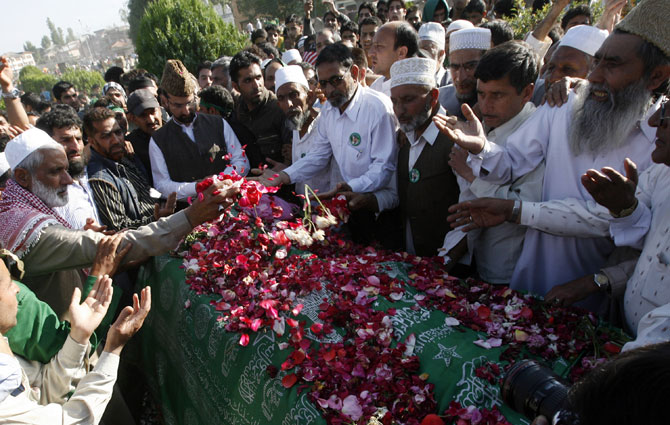
What is the most recent development in Kashmir, that you see, that you think should be conveyed to the outside world?
The fact that we have these unmarked graves. Every three months, four months, five months we have these places that people come up with. (They have) information that they are unmarked graves. There has to be a proper investigation.
There is a call from civil society, by the political parties, that there should be DNA investigation, there should be proper investigations done -- who are these people? So the truth is known.
We have the half widows, the people who are waiting for their kith and kin, you have the association of disappeared persons. Every month they are on the streets, agitating. On these issues we feel the world community has been completely silent.
We understand economics is important. India is a big player, big economy. The Americans have shifted their approach. The British have shifted their approach. They don’t talk much about human rights violations today. They are very selective about their foreign policy. Somewhere they will say yes, we need to intervene. Somewhere they say, well, it’s a bilateral issue and the people need to sort out on their own. I think these double standards need to change.
I think Kashmir is an active issue. The fact that what we saw at the LoC two weeks back (late August) could have turned into a dangerous, ugly situation.
They have to realise the potential threat to peace is not Afghanistan, is not south Asia, is not the Middle East or Egypt and others. It is here. This region. This can flare up any time, if things are not under control and if good sense does not prevail on the leadership of India and Pakistan.
As far as the Hurriyat is concerned we are ready to support any initiative which is aimed at resolving the problem.
As far as the people are concerned they want to be peaceful, they want to be non-violent.
...
Photographs: Reuters/Danish Ismail